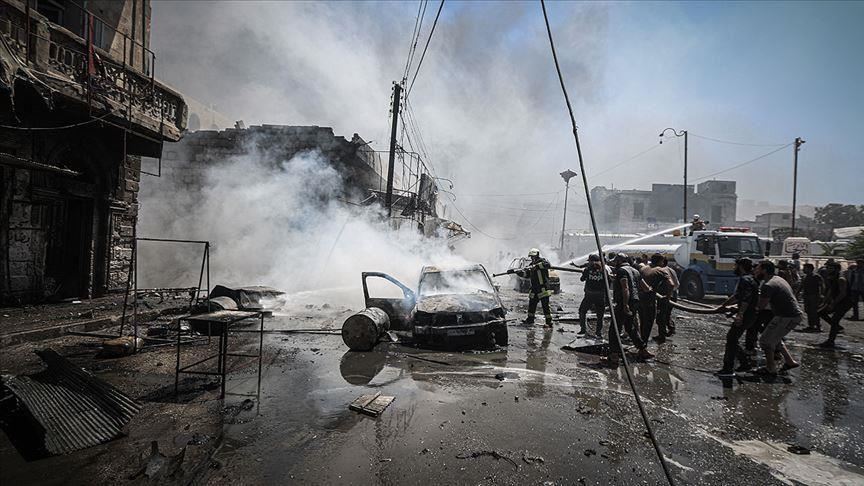Syrian regime seize Madaya village, 2 farms in Idlib
Bashar al-Assad regime forces launched intense artillery, airstrikes in Idlib, despite Astana agreements

IDLIB, Syria
Violating Astana agreements, Syria’s Bashar al-Assad regime on Thursday, launched intense air and land attacks in northwestern Idlib province.
Backed by Russia, the forces bombed four villages in Al-Tamanah and Kafr Roma towns of Idlib's Khan Sheikhoun and Kafranbel districts, according to Syrian opposition sources.
This is the same area, where the regime had carried out a chemical weapon attack in 2017.
The regime forces have captured Madaya village and two farms, after wresting Hobait town, Kafr Ain village, Tal Tari and Sukeik hills -- bordering Hama province in the south of Idlib -- from the Free Syrian Army (FSA).
Currently, fighting is on, between the anti-regime armed groups and the forces of al-Assad regime, near the village of Abdin and the Sukeik hill.
With regime forces seizing Hobait town, other areas like Hama province's northern Ltamenah and Kafr Zita towns have been put to risk, which were long held by the opposition forces.
After the regime forces took control of the town of Hobait, the battle in the region has changed the course, the opposition sources said.
The observation post of Turkish Armed Forces in the southeast of Morek region, in Hama province may face threat, in case the regime forces extend their attacks or continue to lay siege.
The observation post, located 88 kilometers (55 miles) from the Turkey-Syria border, was established in Arpil 2018. It was the ninth observation post established in Syria’s northwestern province of Idlib.
The province of Idlib -- one of the most targeted areas by the regime forces -- has been a stronghold of opposition since the beginning of the civil war in Syria. Its population has reached four million due to internal migration.
The Astana peace process, aimed at ending the Syrian conflict, was launched in January 2017 by Russia and Iran, allies of the regime, and Turkey. So far 13 rounds of talks have been conducted in Astana, the capital city of Kazakhstan.
Last September, in the Russian city of Sochi, Turkish President Recep Tayyip Erdogan and his Russian counterpart Vladimir Putin agreed to set up a demilitarized zone -- in which acts of aggression are expressly prohibited -- in Idlib.
Under the deal, opposition groups in Idlib were supposed to remain in areas, where they were already present. Russia and Turkey were to carry out joint patrols in the area, to prevent resumption of fighting.
On Oct. 10, the Turkish Defense Ministry announced that the Syrian opposition and other anti-regime groups had completed the withdrawal of heavy weapons from the Idlib demilitarized zone.
Despite the cease-fire agreement, the Assad regime and its allies continued their low-intensity attacks on Idlib’s de-escalation zone.
The conflict in Syria began in 2011, when the Assad regime cracked down on demonstrators with unexpected ferocity.
Since then, hundreds of thousands of people have been killed and more than 10 million others displaced, according to UN officials.
* Writing by Jeyhun Aliyev
Anadolu Agency website contains only a portion of the news stories offered to subscribers in the AA News Broadcasting System (HAS), and in summarized form. Please contact us for subscription options.







